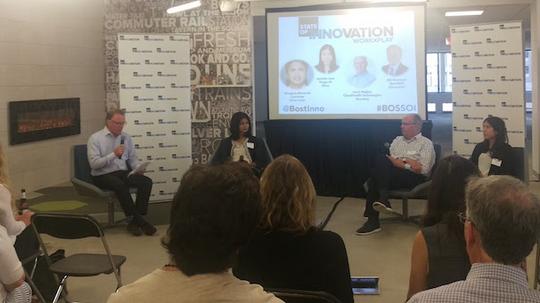
How do startups get through that initial burst of growth?
That was the topic of BostInno's third and final event for its State of Innovation: WorkXPlay series last Thursday, and the panel featured Nilanjana Bhowmik, co-founder and general partner at Converge; Larry Begley, CFO at CloudHealth Technologies; Jennifer Lum, co-founder and COO at Forge.AI; and William Sorenson, CFO at EnerNOC. The event was presented by Newmark Knight Frank.
Here are some takeaways from the event, which was all about scaling up companies:
1. Don't get tripped up on false positives
Bhowmik said early-stage startups can trick themselves into believing they have already found product-market fit after acquiring their first few customers. Even with a few customers, the product may not be ready for scale, she said.
2. Resist institutional capital for as long as possible
Begley, who previously co-founded venture capital firm .406 Ventures, said early-stage startups should resist institutional capital for as long as possible. The closer to product-market fit you get, the better valuation you can expect from investors.
"You really want to do as much as you can bootstrapped."
"You really want to do as much as you can bootstrapped," Begley said.
3. Some employees may not scale with the company
Lum, who previously co-founded Adelphic, which got acquired by Time Inc. earlier this year, said it's important to recognize that some "rockstar" employees who join your company at an early stage may not have the right skill set for the next stage of the company.
"We have to be aggressive in culling people that don’t scale with the company," Begley added.
4. Test your product early and often
Because things like cloud-based services and co-working spaces have lowered the barrier to entry for startups, competition has significantly increased as a result, Bhowmik said. That's why it's important more than ever for a company to be goal-oriented and test its product early and often, which means testing every six weeks, not every six months.
"It's critical from day one to measure," she said.
5. Building trust with customers is important
It may seem like a given, but startups can sometimes lose sight of what's most important: the customers. Lum said that's why it's important to have employees who are good at building trust with customers.
"If you don't have customer-facing people who are building trust, it's not going to work."
"If you don't have customer-facing people who are building trust, it's not going to work," she said.
6. Take a break from building features
Building out new product features is important, but it's also important once in a while to take a break from that and focus on scaling the product, Begley said.
7. HR is integral to building a good company culture
Begley said human resources is the second most important role after CEO because "it's about setting the stage for the company's culture."
Thank you to our Sponsors!
Interested in aligning your brand with our events? Email us at sales@americaninno.com








